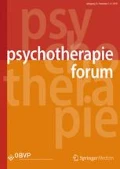Zusammenfassung
Peter Brugger spricht über die von ihm seit Jahren erforschte Beziehung zwischen dem Glauben an paranormale Phänomene (Hellsehen, Telepathie etc.) und Gehirnfunktionen. Es werden Experimente (zur semantischen Bahnung) dargestellt, anhand deren eine neuropsychologische Leistung, z. B. assoziatives Verhalten, als Funktion der Gläubigkeit studiert wird. Die Experimente zeigen, dass gläubige Probanden über eine bessere Bahnung in der rechten Hirnhälfte verfügen, d. h., es ist die rechte Hirnhälfte, die metaphorisch denkt. Das magische Denken hat ein Janusgesicht: Einerseits brauchen wir eine Prise Magie, wenn wir die Grenzen der Wissenschaft überschreiten wollen. Nimmt das magische Denken aber ein pathologisches Ausmaß an, wie z. B. in der Schizophrenie, so erschwert es die Anpassung an die Realität.
Abstract
Peter Brugger talks about his research on the relationship between the belief in paranormal phenomena (e.g., telepathy, clairvoyance) and brain functions. Experiments about semantic priming are being presented, through which a neuropsychological achievement, e.g., associative behavior as a function of belief, is investigated. These experiments show that believing respondents have better priming in the right cerebral hemisphere compared with the left. This is in line with previous indications of indirect and metaphorical thought processes as primarily mediated by the right half of the brain. Magical thinking has a Janusian face: On the one hand we need a little bit of magic if we want to surpass the limits of science. However, if the magical thinking grows to the extent of being pathological, e.g., in schizophrenia, it hinders adaptation to reality.
About this article
Cite this article
Schmid Blumer, H. Magie und Gehirn: Dr. Peter Brugger, Leiter der Neuropsychologischen Abteilung des Universitätsspitals Zürich, im Gespräch. Psychotherapie Forum 16, 81–84 (2008). https://doi.org/10.1007/s00729-008-0243-4
Issue Date:
DOI: https://doi.org/10.1007/s00729-008-0243-4

